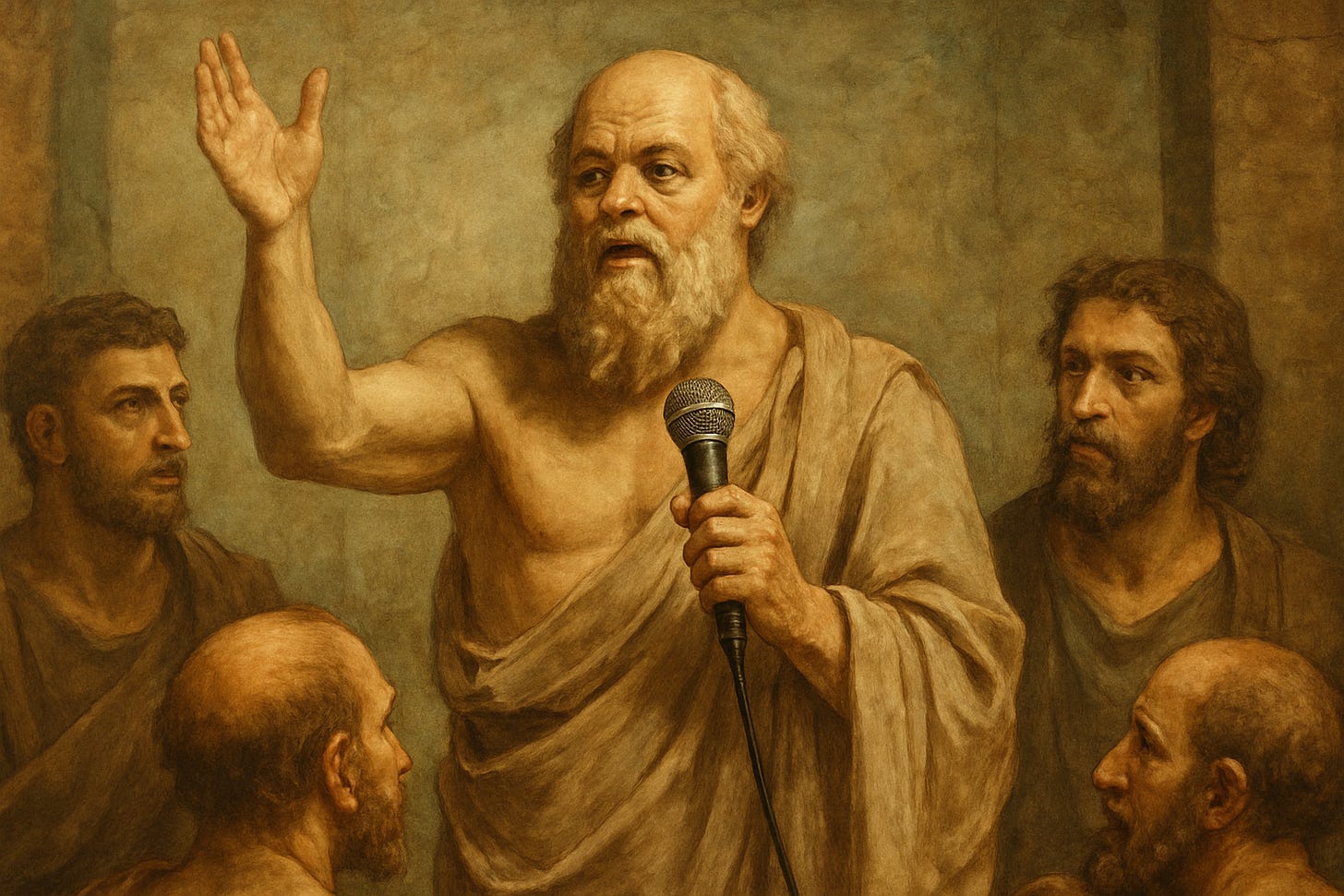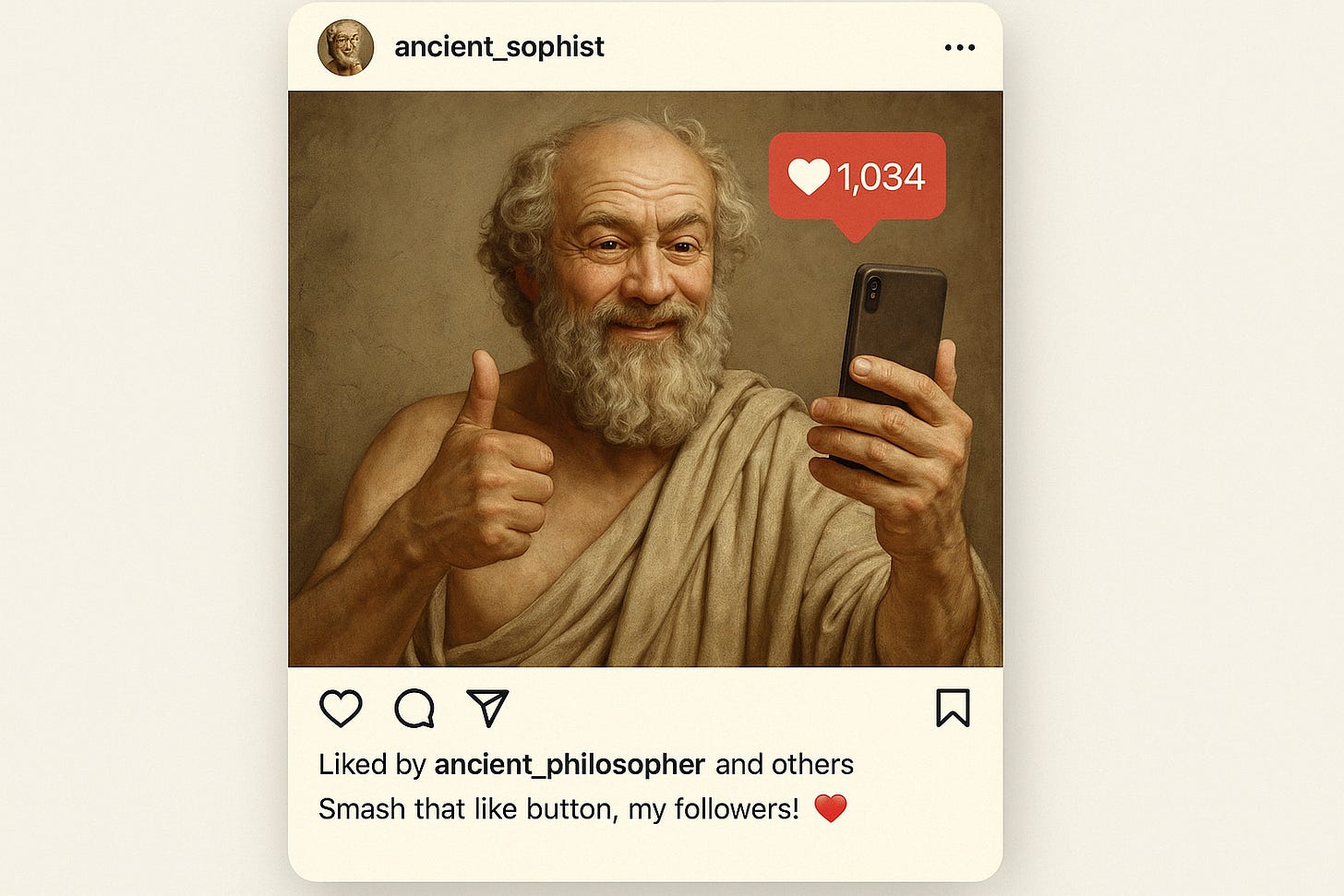“I am wiser than this man; it is likely that neither of us knows anything worthwhile, but he thinks he knows something when he does not, whereas when I do not know, neither do I think I know. So I am likely to be wiser than he to this small extent, that I do not think I know what I do not know.” / Socrates (Apology, Plato)
We often think that we are more advanced than people who lived thousands of years ago in every way. We’ve built rockets that can take us to other planets and we’ve mapped the human genome. We have figured out how to live longer than our ancestors and have access to almost unlimited information in our pockets. We find ourselves at the dawn of a new age where all of us know that AI is going to change everything, even if we disagree on how. Yet, some things still haven’t changed.
Today, we doomscroll our phones and distract ourselves endlessly with hours of entertainment and content. In the ancient world, gladiatorial games kept people entertained and distracted from the real problems that faced them. Juvenal, a Roman writer said that the people of Rome had traded their freedom for “bread and circuses.” In the ancient world, kings and nobles used to flaunt their wealth with palaces, jewels and monuments. Their selfish pursuit of status often drove injustice and oppression. In the world we live in, we fixate on designer brands, luxury cars, and mansions. Only the symbols have changed. The obsession with image remains.
Tens of billions of dollars are spent on self-help, therapy and wellness, yet anxiety and depression are at historic highs (Source). Yes, we are more advanced in many ways than our ancestors. But, the questions that we are asking about how to live a good life are not much different from the questions people were asking thousands of years ago. With our access to information, resources and technology, we should have more access to a good life than ever. That’s not really our experience though. Lies - now known as “misinformation” - become more viral than truth and culture rewards those who can make something trend, not those who identify what is true. Leaders of every type are often chosen for charisma more than character. Influencers sell people curated feeds, crafted messages and packaged lifestyles that they pretend to live. This is not new.
In ancient Athens, there were Sophists. A sophist was a professional teacher of wisdom and rhetoric – persuasive speaking. Athens was the world’s first real democracy. Every free male citizen could speak in their version of Congress/Parliament – the Assembly – and had a vote. The way to be successful in Athens was to convince the most people to vote for your idea. Rhetoric – the art of persuasion – was one of the most valuable skills a person could have. Sophists were paid a lot of money to teach people how to become persuasive speakers. This would help them to live a successful, and “good” life. Sophists knew how to capture people’s attention and tell them what they wanted to hear. What did people want to hear? The same kinds of things they want to hear today. The secrets to success, happiness, and wealth. The good life is living a curated life that looks good. If it looks good, it is good. They even used persuasive testimonials and flashy lifestyles to prove their credibility. Sound familiar?
Sophists measured their success in the applause from the public. Today, Sophists measure their success by followers, likes and clicks. Both are rewarded for looking wise, not for being wise. This isn’t a takedown of all influencers. There are many people who have good lives and influence. The problem is not in having influence. The problem is the pursuit of influence at the sake of truth. The world is filled with Sophists. There are people everywhere telling us what to do and how we should live. What all of these Sophists have in common is their measurement of success is external. Success – the good life – is wealth, reputation, status and power. If a person does certain things, they will gain these external things. If they gain these external things, they will feel better about themselves and their life.
There is a key question about happiness. Do you want to feel better, or do you want to be better? How you answer this question will determine whether happiness is in external things, or internal things. Pursuing wisdom, virtue, truth, and self-mastery will take us in a radically different direction than the pursuit of wealth, reputation, status and power.
truth hurts (and heals)
In The Discourses Epictetus compares talking to a philosopher with going to the doctor. Most people then - just as now - were used to hearing what they wanted to hear. Modern self-help may give us easy answers. Those answers also may be the answers we want to hear. The danger of that is hearing what we want to hear ≠ truth. Jesus said “You will know the truth and the truth will set you free.” Gloria Steinem added the human perspective: “The truth will set you free, but first it will piss you off.” The problem with truth is that is has a way of destroying beliefs that we really like. Truth doesn’t care about our culture, our environment, our personal convictions or our preferences. Truth doesn’t change because we want it to. It stays true, even when we don’t like it. Truth only cares for truth.
There are sophists and philosophers. A sophist will tell you what you want to hear. A philosopher will tell you what you need to hear. “If you go to the doctor, do you expect to leave feeling cheerful? Do you not expect pain from the treatment, burning, cutting, and dieting?” (Discourses). Epictetus says that the problem that we have is that we come to the philosopher as though they were a shopkeeper or a sophist. The world of philosophy is not a world where the “customer is always right.” “If you hear yourself being reproved, do not take offense; just as one who submits to surgery does not take offense at the surgeon’s knife.” (Discourses)
Epictetus tells us that experiencing philosophy is like surgery. It will help us, but also, the application of the cure will be painful. A life saving surgery can help us live, but we will also need to recover. The medicine will not always be what we want to hear or feel. Correction, rebuke and discipline will harm our ego. The purpose of this is not just to make us feel pain: “For just as a doctor has no other end in view than the health of his patient, so the philosopher has no other end than the health of the soul.” (Discourses)
Philosophy wants us to be better.
Sophistry wants us to feel better.
If you break your arm, a doctor can set the bone and walk you through the healing process. Or, you can never really fix it, take pain killers and just try to feel better.
The biggest problem that we have is not that we don’t feel good enough. The problem that we have is that we have brokenness that must be fixed. In the world of healthcare this is called functional medicine. Functional medicine will treat the pain, but will also treat the root causes of the pain. Cicero, a Roman philosopher and orator said: “There is, I assure you, a medical art for the soul. It is philosophy, whose aid need not be sought, as in bodily diseases, from outside ourselves. We must endeavor with all our resources and all our strength to become capable of doctoring ourselves.” (Tusculan Disputations, 3.6). What is Cicero saying? We all have issues, sicknesses and suffering. Our primary issues are not external diseases, but internal struggles. The only way to cure this kind of sickness is to do the work ourselves. Philosophy is what teaches us to be doctors to ourselves. To cure our internal ailments.
“It is not events that harm us, but our opinions about events.”
The greatest problem that you and I have starts with our opinions, our thinking. The problem is not what we experience, it is our response to what we experience.
Musonius Rufus said that philosophy “is nothing more than searching out by reason what is right and proper and by deeds putting it into practice.” You’ve probably seen me write this before. Philosophy is simply the criteria that we have for every decision that we make. The greatest problem that we have is our philosophy. Our philosophy - criteria for making decisions - is broken. Therefore we won’t make good decisions. Bad decisions lead to bad outcomes. Bad outcomes lead to feeling bad.
Instead of changing our philosophy, we have a temptation to seek out just feeling better. But we won’t ever feel good about our bad decisions. And we won’t know our decisions are bad until we interact with philosophy and learn to change our criteria for making them. To change our philosophy, we need to first allow ourselves to be corrected, challenged and critiqued by those who are wiser than us. Then, we learn to correct ourselves and become better people.
be your own doctor (you probably don’t need more self-help)
To live a good life, we ultimately must learn to be doctors to ourselves. I know so many people who go from book to book, seminar to seminar, church to church, mastermind to mastermind and their lives don’t get better. Why? Not because they aren’t investing in themselves, but because they aren’t doing the hard work of applying what they know. Most people’s problem is not that they don’t know enough, its that they don’t do enough of what they know.
Why do we need to learn to do when we can just read another book or get more advice? It’s one thing for me to give you directions, its another thing for me to teach you how to read a map. Advice helps until it doesn’t. Ultimately, the quality of your life - and my life - is up to you. Our lives are singular. We will all reach a point where what worked for one person doesn’t work for us. We are entirely unique. That means that we must learn to live OUR singular life well. Philosophy teaches us the wisdom to live our life well. Advice teaches us how to live like other people. Advice is helpful, but it’s also limited. The wisdom of philosophy is unlimited.
Before you freak out… this picture is bloody, but you really can’t see anything.
Leonid Rogozov was a Soviet doctor on an Antarctic Expedition in 1961. He was the only doctor on the expedition. As winter rolled in, he began to feel pain on the right side of his abdomen accompanied by fatigue and nausea. It was obvious to Leonid that he had appendicitis. He had operated on it many times, but the only problem was that he was the only doctor within thousands of miles. Winter had set in, there was no way to leave, and he knew that if his appendix burst, he would die.
He decided that he would do surgery on himself. At first he tried a mirror, and he couldn’t see, so he decided to take his gloves off and work by touch. After nearly two hours he completed the surgery and stitched himself up. Two weeks later, he returned to his normal duties. He eventually returned home and went on to live a full life.
At the end of the day, the only person who can save you is you. Develop the self-mastery to be a philosopher - a doctor to yourself. And come to your own rescue when you most need it.



